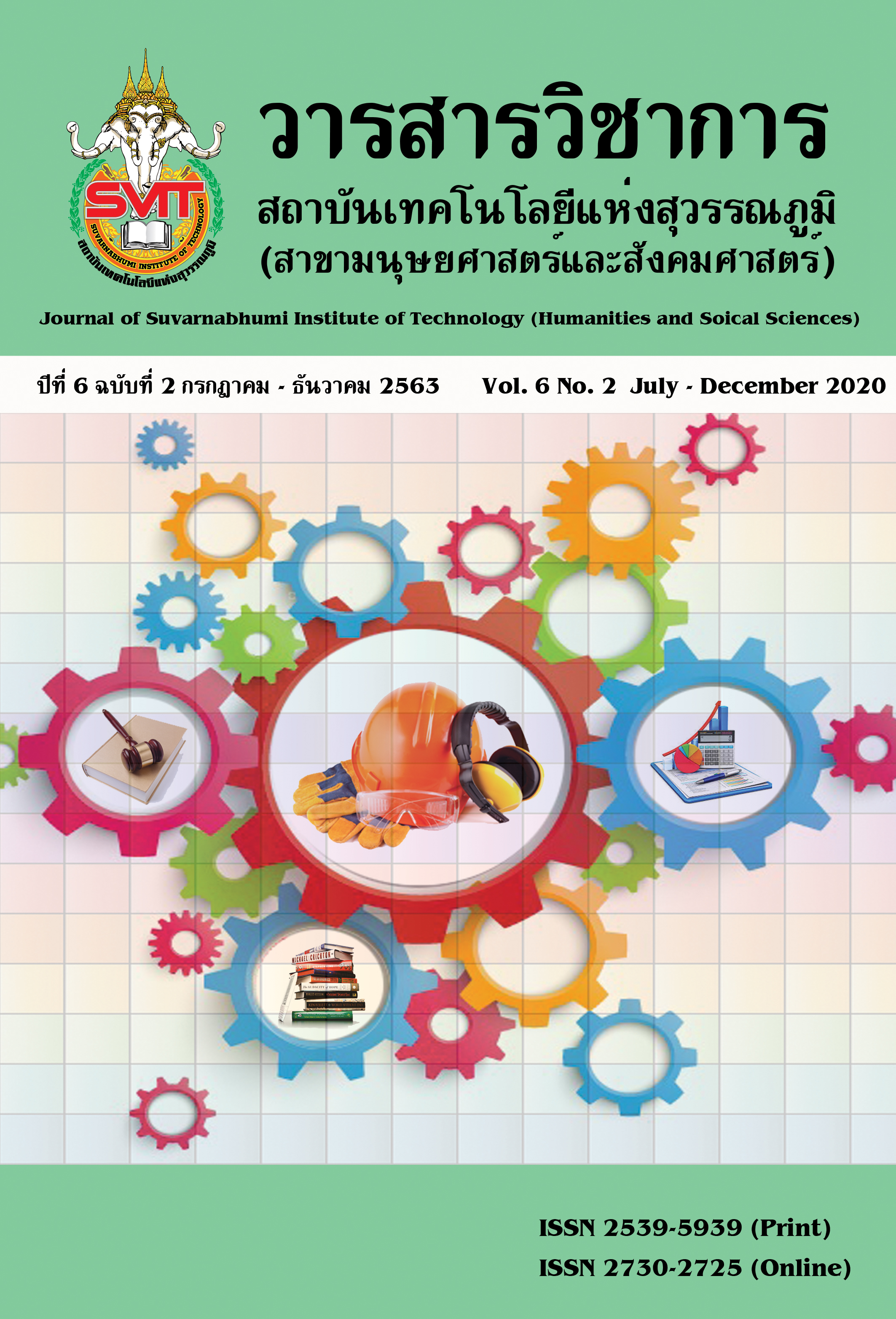STATES, PROBLEMS AND DEVELOPING GUIDELINES OF ACADEMIC STAFFS ORGANIZATION COMMITMENT OF THE PRIVATE UNIVERSITIES IN THAILAND
Keywords:
Organization Commitment, Lecturer, The Private Universities In ThailandAbstract
This research aimed at studying the states, problems and developing guidelines of academic staffs’Organization Commitment of the private universities in Thailand. The instrument used for data collection was a set of five – rating scale questionnaires concerning three aspects of organization commitment, namely affective normative, and continuance commitment. The data of the problems of each aspect had been drawn from the checklist statements by 323 sampling instructors from 37 private universities The developing guidelines for each problem in each aspect of commitment condensed from the structural interview questions from twelve experts. Statistical device used for data presentation were mean, Standard Deviation, frequency, percentage, and consensus of the experts.Results revealed as follows;
- The states of affective and normative commitment were rated by academic staffs at high consideration, while the continuance was rated at moderation
- Organizational engagement problems of the academic staffs were significant issues and solutions for each issue would be as follows; 2.1) Affective commitment faced with the problems of un-cooperation among personnel and unfair in management. The suggested solutions were working should be in teamwork and the criteria of performance evaluation should be clear, 2.2) Normative commitment faced with the problems of inappropriate incomes and lacking of working morale. The suggested solutions indicated that management should be in good governance, 2.3) Continuance commitment faced with the problems of unfair regulations and unclear operating standards. The suggested solutions indicated that working rules should be in brief and conciseness.
References
ทวิพันธ์ พัวสรรเสริญ. (2552). ความผูกพันต่อองค์การของอาจารย์มหาวิทยาลัยภาครัฐในเขตกรุงเทพมหานคร (ปริญญานิพนธ์ปริญญาดุษฎีบัณฑิต สาขาวิชาการบริหารการศึกษา). กรุงเทพฯ: มหาวิทยาลัยรามคำแหง.
ทินวัตร เงินขาว. (2546). ปัจจัยที่ส่งผลต่อความผูกพันต่อองค์การของข้าราชการครูโรงเรียนประถมศึกษาสังกัดสำนักงานการประถมศึกษาจังหวัดกำแพงเพชร (วิทยานิพนธ์ปริญญามหาบัณฑิต สาขาการบริหารการศึกษา). กำแพงเพชร: สถาบันราชภัฏกำแพงเพชร.
นวรัตน์ ศรสุริยา. (2548). ปัจจัยที่มีผลต่อความผูกพันขององค์การและพฤติกรรมการทำงานของบุคลากร ของบริษัทร่วมทุน ไทย ญี่ปุ่น (วิทยานิพนธ์ปริญญามหาบัณฑิต). กรุงเทพฯ: มหาวิทยาลัยศรีปทุม.
นันทนา ประกอบกิจ. (2538). ปัจจัยที่มีผลต่อความผูกพันต่อองค์การ ศึกษากรณีฝ่ายพัฒนาชุมชน สำนักงานเขต สังกัดกรุงเทพมหานคร (วิทยานิพนธ์ปริญญามหาบัณฑิต). กรุงเทพฯ: มหาวิทยาลัยธรรมศาสตร์.
นันท์ธนัตถ์ นิ่มยี่สุ่น. (2557). องค์ประกอบของปัจจัยที่มีผลต่อความผูกพันต่อองค์การของพนักงานในอุตสาหกรรมผลิตคอมพิวเตอร์ อุปกรณ์และส่วนประกอบ นิคมอุตสาหกรรมแหลมฉบัง (วิทยานิพนธ์ ปริญญามหาบัณฑิต). กรุงเทพฯ: มหาวิทยาลัยเกษตรศาสตร์.
ประทุม ฤกษ์กลาง. (2538). ปัจจัยที่มีอิทธิพลต่อความผูกพันต่อองค์การและผลการปฏิบัติงานของอาจารย์มหาวิทยาลัยเอกชน (ปริญญานิพนธ์ปริญญาดุษฎีบัณฑิต สาขาวิชาการบริหารการศึกษา). กรุงเทพฯ: มหาวิทยาลัยศรีนครินทร์วิโรฒ.
วิมล จำปานิล. (2553). รูปแบบความสัมพันธ์โครงสร้างเชิงเส้นของปัจจัยที่มีอิทธิพลต่อความผูกพันโรงเรียนของครูโรงเรียน สังกัดสำนักงานเขตพื้นที่การศึกษาในภาคตะวันออกเฉียงเหนือ (ปริญญานิพนธ์ปริญญาดุษฎีบัณฑิต สาขาบริหารการศึกษา). เลย: มหาวิทยาลัยราชภัฏเลย.
วิทย์ เมฆะวรากุล. (2553). อิทธิพลของความพึงพอใจในค่าตอบแทนต่อความพึงพอใจในการทำงานและความผูกพันต่อองค์การในบริบทของการรับรู้ความยุติธรรมของพนักงานโรงแรมในเขตภาคตะวันออกของประเทศไทย (ปริญญานิพนธ์ปริญญาดุษฎีบัณฑิต). กรุงเทพฯ: มหาวิทยาลัยรามคำแหง.
สิมาภา จันทร์หอมกุล. (2552). ความสัมพันธ์ระหว่างการรับรู้บรรยากาศองค์การความผูกพันในงานและความพึงพอใจในชีวิตของบุคลากร สังกัดกรมสารบรรณทหารบก (วิทยานิพนธ์ปริญญามหาบัณฑิต). กรุงเทพฯ: มหาวิทยาลัยธรรมศาสตร์.
สุรัสวดี สุวรรณเวช. (2549). การสร้างรูปแบบความผูกพันของพนักงานต่อองค์การ (วิทยานิพนธ์ปริญญามหาบัณฑิต). กรุงเทพฯ: สถาบันบัณฑิตพัฒนบริหารศาสตร์.
อนิรุทธิ์ ตุลสุข. (2552). ความสัมพันธ์ระหว่างการรับรู้การเสริมสร้างพลังอำนาจในเชิงโครงสร้างฯ : กรณีศึกษาร้านอาหารญี่ปุ่นในกรุงเทพมหานคร. กรุงเทพฯ: มหาวิทยาลัยธรรมศาสตร์.
อริสรา บุญรัตน์. (2557). แนวทางการพัฒนาภาพลักษณ์ ของมหาวิทยาลัยเอกชนในประเทศไทย (วิทยานิพนธ์ปริญญามหาบัณฑิต). สงขลา: มหาวิทยาลัยสงขลานครินทร์.
อัจฉรา เนียมหอม. (2551). ความสัมพันธ์ระหว่างการรับรู้ความยุติธรรมในองค์การ คุณภาพชีวิตการทำงานและความผูกพันต่อองค์การ:กรณีศึกษาธนาคารกรุงศรีอยุธยา (รายงานวิจัย). กรุงเทพฯ:มหาวิทยาลัยธรรมศาสตร์.
Colquitt,J.A., LePine,J.A., Wesson.M.J. (2011). Organizational Behavior (2nd ed.). New York: McGraw-Hill/ Irwin,Inc.
Cronbach, L. J. (1990). Essentials of psychological testing (5thed.). New York: Harper Collins Publishers. 202-204.
Irving,P.G., Meyer,J.P,. (1994). Re-exammination of the Met-Expectations hypothesis:A Longitudin alanalysis. Journal Applied Psychology, (79), 937-949.
Krejcie, R. V. & Morgan, D. W. (1970). Determining Sample Size for Research Activities. Educational and Psychological Measurement, 30(3), 607-610. Lincoln,James R, & Kalleberg,Arne L. (1990). Cultural effects on employee loyalty in japan and the U.S : Individual or Organization level .Sage Journals, 12(4), 607- 609
Martin ,Thomas N , & Hafer, John C,. (1995). The Multiplicative Interaction Effects of Job Involvement and Organizational Commitment on the Turnover Intentions of Full- and Part- Time Employees. Journal of Vocational Behavior, 46(3), 310-331
Meyer,J.P. & N.J. Allen. (1997). Commitment in the workplace. Theory, Research, and Application Thousand Oaks, CA: Sage Publications,Inc.
Downloads
Published
Issue
Section
License
The articles published are copyrighted by the Sarasas Journal of Humanities and Social Science. The opinions expressed in each article in this academic journal are those of the individual authors and do not reflect the views of Sarasas Suvarnabhumi Institute of Technology. The authors are solely responsible for all aspects of their respective articles. Any errors or inaccuracies in the articles are the sole responsibility of the authors.



